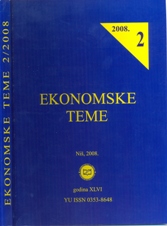Economic Themes (2008) 46 (2) 3, 21-38
Slavica Manić
Abstract: Last wave of globalization is characterized by rapid changes concerning different areas of economic activities, particularly those experienced in the technology domain. Although these trends were expected to be of all-inclusive kind, it is now obvious their benefits are not equally distributed. Various indicators almost quite similarly (using more or less the same parameters) measure technology potential of countries. If we take Serbia as an example, their results are corresponding, i.e. it is relatively backward economy. In this sense, if technological competitiveness is assumed to be influential for overall level of competitiveness, no wonder Serbia achieved bad results in global competitiveness ranking (technology backwardness is in accordance with low level of competitiveness) which resulted in its being classified in transitional phase from factor-driven to investment-driven economy. However, leaving these concrete examples aside, certain shortcomings (referring to usual comprehension of technological significance and its influence on the level of competitiveness) have been noticed from the methodological standpoint: 1) from theoretical point of view, technology relevance has been stressed in the extent not compatible with its position in the global competitiveness indicator made by WEF (technology sub-index is just one of them, having different weights in determining competitiveness of developed and developing countries), whereas other indicators (dealing with technological capabilities in more detailed way) rarely stressed their dominant influence on the competitiveness level; this way that overemphasized role of technology and its impact on economic growth was underestimated exactly by those insisting on inevitability and absolute necessity of technological changes; 2) global competitiveness concept, almost completely neglects sustainable development’s idea; it includes environmental sustainability components only in irrelevant sub-indexes; that is why we are wondering would competitiveness ranking have been changed, if economists (instead of having been occupied with growth problems) had really taken care of development ones. These and some other problems (which will be explicitly mentioned in the paper) represent the main subject of this review article.
Keywords: indicators; technology; competitiveness
WHY DO WE NEED NEW INDICATOR OF COMPETITIVENESS?
Slavica Manić
Abstract: Last wave of globalization is characterized by rapid changes concerning different areas of economic activities, particularly those experienced in the technology domain. Although these trends were expected to be of all-inclusive kind, it is now obvious their benefits are not equally distributed. Various indicators almost quite similarly (using more or less the same parameters) measure technology potential of countries. If we take Serbia as an example, their results are corresponding, i.e. it is relatively backward economy. In this sense, if technological competitiveness is assumed to be influential for overall level of competitiveness, no wonder Serbia achieved bad results in global competitiveness ranking (technology backwardness is in accordance with low level of competitiveness) which resulted in its being classified in transitional phase from factor-driven to investment-driven economy. However, leaving these concrete examples aside, certain shortcomings (referring to usual comprehension of technological significance and its influence on the level of competitiveness) have been noticed from the methodological standpoint: 1) from theoretical point of view, technology relevance has been stressed in the extent not compatible with its position in the global competitiveness indicator made by WEF (technology sub-index is just one of them, having different weights in determining competitiveness of developed and developing countries), whereas other indicators (dealing with technological capabilities in more detailed way) rarely stressed their dominant influence on the competitiveness level; this way that overemphasized role of technology and its impact on economic growth was underestimated exactly by those insisting on inevitability and absolute necessity of technological changes; 2) global competitiveness concept, almost completely neglects sustainable development’s idea; it includes environmental sustainability components only in irrelevant sub-indexes; that is why we are wondering would competitiveness ranking have been changed, if economists (instead of having been occupied with growth problems) had really taken care of development ones. These and some other problems (which will be explicitly mentioned in the paper) represent the main subject of this review article.
Keywords: indicators; technology; competitiveness

